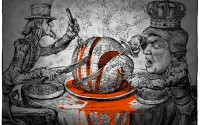9 May 2004Sarah Lyall
Earlier this year, George Osborne, a Conservative member of Parliament, took a straw poll of some legislators from his party. The subject was President Bush. The results were not pretty.
"George Bush scares the hell out of me," one Tory said, according to an article by Mr. Osborne in The Spectator. Another told him: "Bush is a man who might wail at the moon. I don't feel comfortable with him." A third said that while he would vote for Bush in November if he could, "I think Anglo-American relations would be better if Kerry won."
That was long before pictures showing the humiliation of Iraqi prisoners were published all over the world, horrifying even Mr. Bush's allies. And the people Mr. Osborne polled were all Conservatives, by tradition and temperament the Republican Party's natural friends across the Atlantic.
But perhaps the only surprising thing about the vehemence of anti-Bush feeling, based on a reading of newspapers, opinion polls and interviews around Europe, is how unsurprising it truly is. In fact, one reason the recent disclosures have proved so damaging to the American cause here is that Mr. Bush had so little good will upon which to draw.
Across Europe, anti-Bush feeling has contributed to a consensus that the coming American election is of singular importance: for the United States, certainly, but also for the rest of the world. Anxieties about the direction America is going are accompanied more often than not by a passionate desire, cutting across national borders and party lines, to see President Bush voted out of office in November.
Europeans are in general more liberal than Americans, and among Europe's mainstream liberals, rejecting Mr. Bush is a matter of course. But a strange thing seems to have happened to many conservatives, who would ordinarily be the American president's cheerleaders. Even those who favor him seem loath to admit to wholehearted support, tempering their praise with caveats and qualifications.
It is as if admiring Mr. Bush is seen as slightly shameful among thinking Europeans, like confessing a preference for screw-top wine bottles.
"I must say, he's not very popular," said Sergio Romano, an Italian teacher and commentator who has served as ambassador to NATO and to the former Soviet Union. "It's quite understandable that he wouldn't be popular with the bulk of the center-left European intelligentsia, but he's not very popular with the conservatives or moderates either."
In Britain, Lawrence Freedman, a professor of war studies and the vice principal for research at King's College London, paused for an awkward moment when asked about an article he had written for The Financial Times arguing that Mr. Bush seemed "the safer bet," based on past experiences with second-term United States presidents.
"I wouldn't want to come across as a supporter of President Bush," Mr. Freedman said. "It was more of not being pro-Bush, but of explaining why Europeans, despite appearances, might end up not being unhappy if Bush was elected."
In poll after poll, Europeans have shown themselves to be fervently anti-Bush. In Britain, America's staunchest ally in the war in Iraq, a poll of 1,007 people taken last month for The Times of London by the British polling company Populus found support for Senator John Kerry over President Bush by a margin of 56 to 22 percent.
From America, a poll of people in nine nations conducted by the Pew Research Center for the People and the Press in March found that opinion of the president and, by extension, the United States, had plummeted across Europe since Mr. Bush took office.
In France, the poll found, the president had an 85 percent negative rating; in Britain, 57 percent; in Germany 85 percent; and in Russia, 60 percent.
"People say, 'I'm very frustrated that I can't vote in the U.S. elections, because these are the ones that affect my way of life more than anything else,' " Ken Dubin, a political scientist at Carlos III University in Madrid, said in an interview.
Referring to the prewar meeting last year of President Bush, Prime Minister Tony Blair of Britain and José María Aznar, who was then the prime minister of Spain and whose recent election loss was attributed to antiwar feelings by Spanish voters, Mr. Dubin said, "I've heard the comment, 'One down, two to go.' "
In an editorial in March, the left-leaning British newspaper The Guardian put it more starkly. "Senator Kerry carries the hopes not just of millions of Americans but of millions of British well-wishers, not to mention those of nations throughout Europe and the world," the newspaper wrote. "Nothing in world politics would make more difference to the rest of us than a change in the White House."
Of course there are Bush supporters here. Mr. Osborne is one: "I think he's been a good president for the U.S. and for Britain, and I'd like to see him re-elected," Mr. Osborne said in an interview.
So are leaders like Mr. Blair and Prime Minister Silvio Berlusconi of Italy. Many European thinkers, while acknowledging the depth of anti-Bush feeling, say it is simplistic and unfair.






